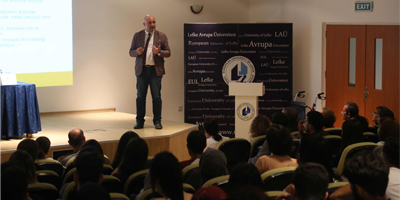“Psychosocial Needs and Change in Multiple Sclerosis (MS)” themed Panel held at EUL

European University of Lefke (EUL) Faculty of Health Sciences and Department of Social Services organized a panel themed “Psychosocial Needs and Change in Multiple Sclerosis (MS)”. Academician of Hacettepe University Faculty of Economics and Administrative Sciences Department of Social Services Prof. Tarık Tuncay attended the panel as a speaker. The opening speeches of the panel were made by Sibel Hançerli, the President of the Turkish Cypriot MS Association and Dean of the EUL Faculty of Health Sciences. Prof. Dr. Şengül Hablemitoğlu.
Hançerli: Social support to MS patients is vital
Sibel Hançerli, the President of the Turkish Cypriot MS Association who made a speech at the panel said that the number of MS patients in the TRNC is over 300 and approximately 15 people are diagnosed each year. Susan emphasized the importance of social support while highlighting the problems experienced by patients in her opening speech.
Hablemitoğlu: Treatment of the disease should be handled with a holistic approach
Dean of the EUL Faculty of Health Sciences. Prof. Dr. Şengül Hablemitoğlu emphasized the importance of the field of medical social work in her opening speech and stressed that human health has physical, psychological, emotional and social dimensions and therefore the treatment of the disease should be handled with a holistic approach.
Tuncay: The most important task of social workers in the MS treatment process is to provide psychosocial support to the patient and the family.
In his presentation focusing on psychosocial needs and effective coping with MS, Panel speaker and academician of Hacettepe University Faculty of Economics and Administrative Sciences Department of Social Services Prof. Tarık Tuncay stated that the MS treatment team consists of a multidisciplinary team and that social workers are members of this team. Tuncay also said that the most important task of social workers in the MS treatment process is to provide psychosocial support to the patient and the family. He further stated that while offering psych-social to the painted in the treatment of chronic diseases such as cancer, diabetes, MS and renal failure, that during the course of the disease, it is necessary to increase or protect the function, comfort, safety and independence, to provide the patients with self-management and behaviour change training, to provide appropriate assistive devices and to determine the environmental changes when necessary and to strengthen the individual and the family.
At the end of the presentation, effective coping with change was applied to the panel participants.
